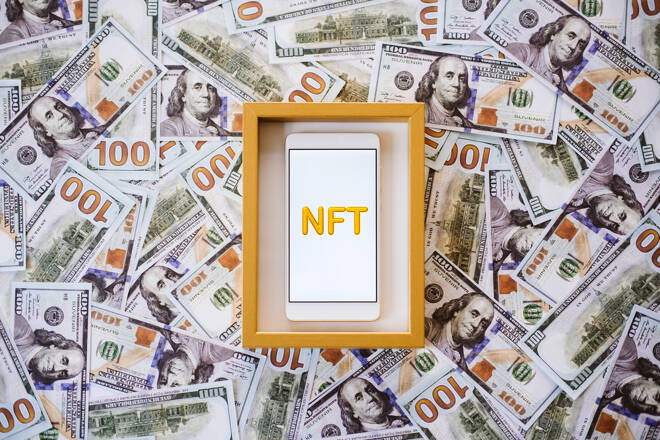Advertisement
Advertisement
NFT Marketplace HitPiece Sells Music Assets Without Permission
By:
NFTs are back in the news. HitPiece has been creating and selling NFTs without permission, raising the prospects of a regulatory clampdown.
NFT marketplace activity continues to keep the crypto news wires busy in early February. Earlier this week, news hit the wires of a rise in scams and thefts on the NFT marketplace, putting NFTs in the spotlight. OpenSea, the leading NFT marketplace, has faced a number of exploits in recent weeks.
In late January, news hit the wires of OpenSea refunding 750 ETH to users who had succumbed to NFT exploits. The news followed backlash from the community over the capping of the number of NFTs a creator can mint. Creators can mint NFTs on the Ethereum (ETH) and Polygon (MATIC) blockchains.
This year, the NFT marketplace has drawn plenty of interest, leading to a surge in trading volumes. According to a report on Monday, NFT trading volume was on target for a $7bn ATH in January. To put things into perspective, NFT trading volume for calendar year 2020 was just $21.7m
For the NFT marketplace, bad actors and surging trading volumes are a bad combination from a regulatory standpoint. Regulatory chatter has been on the rise in recent weeks and the NFT marketplace has not managed to avoid detection.
Shift in NFT Regulatory Landscape Imminent
Governments and regulators in China, India, the UK, and the U.S all have NFTs in their sights. In early January, UK members of Parliament (MPs) called for the government to impose tougher regulation on cryptos and NFTs. A UK Treasury Department response is in the works. In January, the Indian government announced the creation of a new FINTECH division to oversee cryptos, crypto launches and NFTs.
With the White House set to issue an Executive Action in the coming weeks on crypto regulation, the landscape could see a material shift. Following the Bank of England’s calls for a global regulatory framework, the Executive Action could become the blue print for regulators globally.
When considering the increased level of scrutiny, negative NFT chatter is likely to increase regulator interest in the space.
HitPiece Caught Out Selling Music Assets Without Permission
HitPiece is an NFT marketplace designed to be “the place for music NFTs online”. Artists would receive royalties from the initial sales of NFTs and then from ongoing trading of the NFTs. This would provide artists and rights holders with an ever-lasting income stream.
According to news that hit the wires overnight, however, HitPiece has been selling NFTs without the knowledge of the artists. More significantly, HitPiece reportedly not only sold but also created the NFTs without the consent of artists.
Twitter has been inundated with Tweets from artists and music lovers of the fraudulent activity.
In response to a HitPiece apology on Twitter, one artist named Dollar Signs tweeted that he turned the twitter apology into an NFT available for sale on Rarible. It’s ironic, with Dollar Signs unlikely to have obtained permission from HitPiece before creating the NFT.
I turned HitPiece's twitter apology into an NFT that you can buy for $2000 https://t.co/ZmDvLgfdpD
— 𝘿𝙊𝙇𝙇𝘼𝙍 𝙎𝙄𝙂𝙉𝙎 (@DollarSignsBand) February 2, 2022
While an unregulated entity, HitPiece could be in hot water for the creation and sale of music NFTs without permission. Law enforcement agencies will need to first work out where HitPiece was launched. Wire fraud and other digital crimes tend to have hefty penalties. These could be even more punitive if there were any copyright infringements.
For regulators, this is just one more reason to get more active in the NFT space.
About the Author
Bob Masonauthor
With over 28 years of experience in the financial industry, Bob has worked with various global rating agencies and multinational banks. Currently he is covering currencies, commodities, alternative asset classes and global equities, focusing mostly on European and Asian markets.
Advertisement
